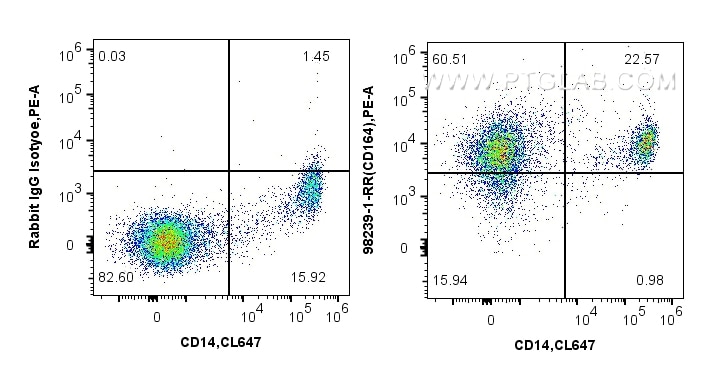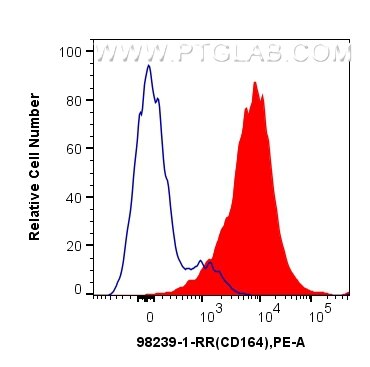Tested Applications
| Positive FC detected in | human PBMCs |
Recommended dilution
| Application | Dilution |
|---|---|
| Flow Cytometry (FC) | FC : 0.25 ug per 10^6 cells in 100 μl suspension |
| This reagent has been tested for flow cytometric analysis. It is recommended that this reagent should be titrated in each testing system to obtain optimal results. | |
| Sample-dependent, Check data in validation data gallery. | |
Product Information
98239-1-RR targets CD164 in FC applications and shows reactivity with human samples.
| Tested Reactivity | human |
| Host / Isotype | Rabbit / IgG |
| Class | Recombinant |
| Type | Antibody |
| Immunogen | Recombinant protein Predict reactive species |
| Full Name | CD164 molecule, sialomucin |
| Calculated Molecular Weight | 21kDa |
| GenBank Accession Number | NM_006016.6 |
| Gene Symbol | CD164 |
| Gene ID (NCBI) | 8763 |
| Conjugate | Unconjugated |
| Form | Liquid |
| Purification Method | Protein A purfication |
| UNIPROT ID | Q04900-1 |
| Storage Buffer | PBS with 0.09% sodium azide, pH 7.3. |
| Storage Conditions | Store at 2 - 8°C. Stable for one year after shipment. |
Background Information
Sialomucins are a heterogeneous group of secreted or membrane-associated mucins that appear to play 2 key but opposing roles in vivo: first as cytoprotective or antiadhesive agents, and second as adhesion receptors. CD164 is a type I integral transmembrane sialomucin that functions as an adhesion receptor (PMID: 9680353)(PMID: 17077324). Sialomucin CD164 (MUC-24), also referred to multi-glycosylated core protein 24 (MGC24), is known to function as a receptor that regulates stem cell localization to the bone marrow. CD164 may play a key role in hematopoiesis by facilitating the adhesion of CD34+ cells to the stroma and by negatively regulating CD34+CD38(lo/-) cell proliferation. Important role of CD164 in in prostate cancer metastasis, promoting myogenesis and regulating myoblast migration so far have been revealed (PMID: 9763543)(PMID: 16859559)(PMID: 17077324).
Protocols
| Product Specific Protocols | |
|---|---|
| FC protocol for CD164 antibody 98239-1-RR | Download protocol |
| Standard Protocols | |
|---|---|
| Click here to view our Standard Protocols |





